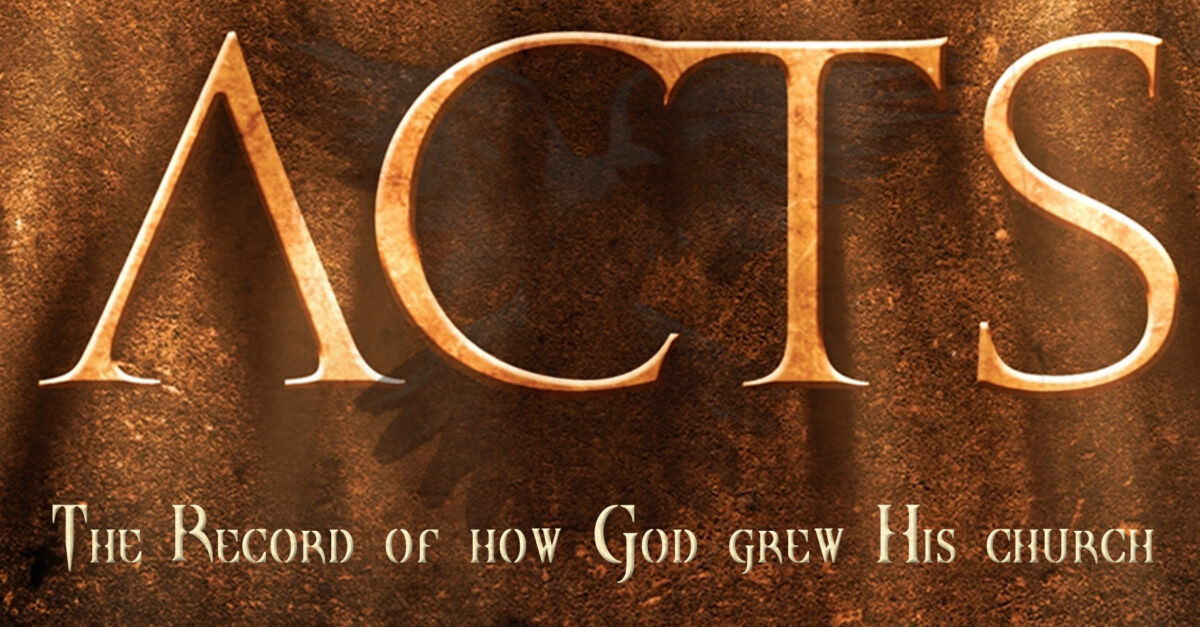Acts 11:19-30 New International Version (NIV)
The Church in Antioch
19 Now those who had been scattered by the persecution that broke out when Stephen was killed traveled as far as Phoenicia, Cyprus and Antioch, spreading the word only among Jews. 20 Some of them, however, men from Cyprus and Cyrene, went to Antioch and began to speak to Greeks also, telling them the good news about the Lord Jesus. 21 The Lord’s hand was with them, and a great number of people believed and turned to the Lord.
22 News of this reached the church in Jerusalem, and they sent Barnabas to Antioch. 23 When he arrived and saw what the grace of God had done, he was glad and encouraged them all to remain true to the Lord with all their hearts. 24 He was a good man, full of the Holy Spirit and faith, and a great number of people were brought to the Lord.
25 Then Barnabas went to Tarsus to look for Saul, 26 and when he found him, he brought him to Antioch. So for a whole year Barnabas and Saul met with the church and taught great numbers of people. The disciples were called Christians first at Antioch.
27 During this time some prophets came down from Jerusalem to Antioch. 28 One of them, named Agabus, stood up and through the Spirit predicted that a severe famine would spread over the entire Roman world. (This happened during the reign of Claudius.) 29 The disciples, as each one was able, decided to provide help for the brothers and sisters living in Judea. 30 This they did, sending their gift to the elders by Barnabas and Saul.
In verses 19-21, The Gospel was spreading everywhere even to Antioch that was in Syria. It was in the northern city for trade. People from many different countries did business there together. Many Gentiles went to Jewish synagogues there. Some such Gentiles received circumcision. But some such Gentiles did not. They were ‘God-fearers’ like Cornelius. The differences between Jews and Gentiles mattered a lot in Jerusalem. But in Antioch, it did not matter as much. So, there, some Jews who spoke Greek preached about Jesus to Greek Gentiles also. This probably happened when they met together in the synagogues. Many Gentiles followed the new faith.
The Christians in Jerusalem sent Barnabas to Antioch. They wanted to know what was happening. This does not mean that they were angry. Barnabas was a Jew who spoke Greek. His name meant ‘someone who encourages’. The church in Antioch was a new one. They may have wanted to be friendly to those new Christians. So, that was why they sent Barnabas there.
‘Barnabas saw that God had done good things for the people’ (verse 23). Perhaps they had changed the way that they lived. Many people in Antioch did bad things. Perhaps the new believers did not do those bad things any longer now. Maybe they surprised people in that way. Perhaps they were using the gifts from the Holy Spirit.
Barnabas was pleased. He did not need to teach those people who had already become believers. But he told them that they must continue to follow Jesus. Nothing must stop them. It seems that Barnabas became a leader in the church at Antioch. He was a good man. This was because he was full of the Holy Spirit and faith. When a person is like this, God works by means of him or her. God worked by means of Barnabas. Because of Barnabas, ‘many people decided to trust the Lord’ (verse 24).
Barnabas had done great things. However, he knew when to ask for help. Now, because there were many more new believers, Barnabas needed someone to help him. It did not worry him that he would be sharing his work. He considered that the church was most important. Leaders of churches today should try to be like him.
Barnabas remembered Saul. Saul was the right person for this work with the Gentiles (Acts 9:15, 27). Saul was in Tarsus. The believers in Jerusalem had sent him there for safety (Acts 9:28-30). That was about 7 or 8 years before. Now Barnabas fetched him. Together, they taught the many new believers in Antioch.
The pagans in Antioch were famous because they used words in clever ways. So, they made up a name for the believers. They called the believers ‘Christians’. (The Greek word is ‘Christianoi’.) The pagans probably meant this to be a joke. It was probably because the believers were always talking about Christ. Certainly, the believers did not call themselves ‘Christians’. But this name showed that people considered the new faith as different from Judaism.
Claudius was the Emperor from AD 41-54. During this time, there were 5 famines in the Roman empire. They happened in different parts of it. Actually, 5 writers recorded that they happened. One was the Jewish writer Josephus (AD 37-100). He wrote about a famine in Judea. It happened between AD 44 and 48. But the believers in Antioch knew that it would happen. They knew because Agabus had told them about it. So, they could prepare for it. They had not met the believers in Judea. But the believers in Antioch knew that both the groups belonged to God’s family now. So, they helped the believers in Judea.
Christians today have sisters and brothers all over the world. Everyone who believes in Jesus and follows god’s word is our brother or sister. That is why we must help each other. Although we may never meet some Christians on earth, they are our brothers or sisters.
So, Barnabas and Saul went back to Jerusalem. They took money to help the believers there.
